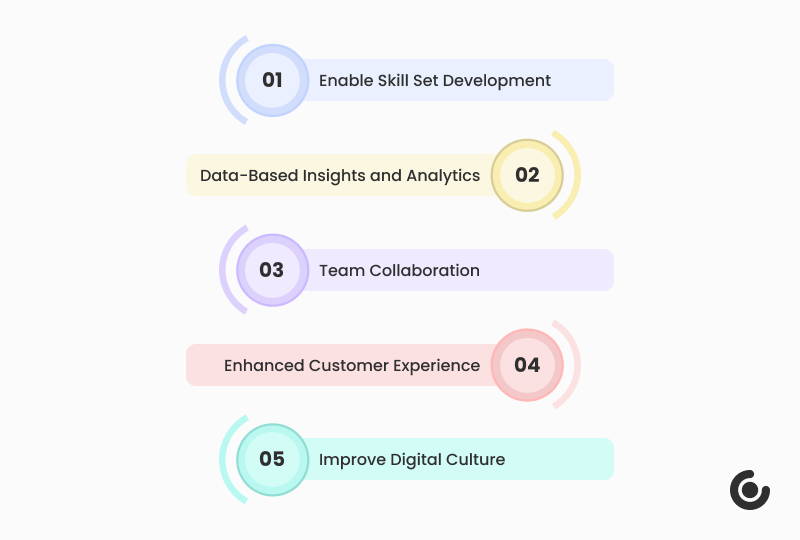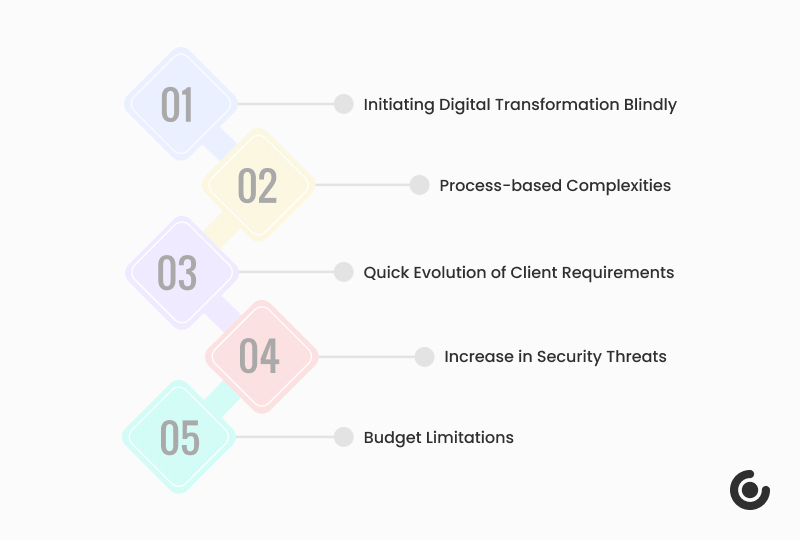Digital Transformation Benefits & Challenges

Table of Contents
To stay competitive in 2022 and beyond, organizations must accelerate their digital initiatives to realize the benefits of digital transformation in business. Digital transformation has become an even more important topic due to the pandemic.
So, the digital transformation investment marketplace will mature at a higher CAGR as organizations progress on their current business strategies to turn into future digital enterprises by leveraging innovative technologies and tools. However, even the biggest challenges of digital transformation are involved with the benefits of digitalization in business.
Data and analytics in today’s time are a highly valued resource for every organization and its professionals. It is a vital asset that one cannot let go of to gain advantages of digital transformation.
Furthermore, organizations have built numerous technology services by leveraging digital devices and networks smartly. With digital innovations, the business strategy and tactics fundamentally steer an organization’s success.
In the coming time, businesses are likely to invest immensely in technologies like Advanced Digital Twins, Modern Robotics, Genomics, Blockchain, Machine Learning (ML), Artificial Intelligence (AI), Internet of Things (IoT), Augmented Reality (AR) and Virtual Reality (VR).
A company’s financial performance is given a hike by the digital transformation initiatives and excellent results in the long-term if driven consistently. In this blog, we will discuss both digital transformation opportunities and challenges in 2022.
Benefits of digital transformation
We can consider many factors linked with the utmost benefits that a digital transformation roadmap can offer. Let us discover some of the important ones.
1) Enable Skill Set Development
It is very natural for an organization to expect their employees to be effective with their skill sets and smooth in their job. With the requirement and upsurge of Digital Transformation acceptance, the staff should keep up with the forthcoming trends.
When this happens, nurturing new technologies and tools is simpler. And the industries would not face more challenges.
2) Data-Based Insights and Analytics
Digital marketing efforts comprising key metrics can be easily monitored and tracked. These insights come in handy expansively as it assists you in comprehending some vibrant information based on your operational and business strategies.
This feedback data impacts and places your decision-making skill sets in the precise direction and offers a better Return on Investment (ROI).
3) Team Collaboration
As teams build their organizations across the digital sphere, Digital Transformation offers an excellent opportunity for organizational alliance. When every department of the same company works for a solitary goal, the probability of achieving immense growth and maturity is higher.
4) Enhanced Customer Experience
The digital experience relies upon how contented the client is, and it is projected on organizations to recognize that too. With organizations continuously working on improving their digital strategies, they can drastically enhance their customer experience.
5) Improve Digital Culture
Industries steer digital innovations and can make the most out of them straightforwardly by working on their skills, which can entirely stay exclusive to them.
Furthermore, the digital age inspires constant learning. There is no healthier approach to keep your employees involved than to rejoice in attaining a new skill set or gaining new tools and technology.
Digital transformation challenges
With every optimistic side that enables advantages for organizations, there come challenges that can be resolved or ignored as per the scenario. Let us look at some challenges the digital transformation companies face when implementing Digital Transformation strategies.
1) Initiating Digital Transformation Blindly
While in the initial stages of digital transformation, most companies commence it blindly by adding needless technology and tools, believing it is a one-time procedure.
Blindly taking initiations will kill the procedure from the commencement. Consequently, before opening the transformation journey, companies must be watchful of their present state.
Aggregating adequate client data and mapping out client journeys is a great approach to initiate, as it assists with the precise business strategy and tactics.
2) Process-based Complexities
As technology and tools advance, companies continually craft new business strategies to assist users in using and enhancing their current tools. Innovative tools and new technologies call for various systems, which, in turn, can be multifaceted, perplexing, and irresistible, and humans are merely not able to handle them all at once.
To sidestep this scenario, you must find approaches to simplify and rationalize your digital systems that offer employees a unified experience that can steer successful business results.
3) Quick Evolution of Client Requirements
Companies are continually budding; hence, client stakeholders must alter as the world advances and industries transform. Transforming a company’s digital strategy is not a simple task. Exhaustive reformatting often takes years to complete.
What if your clients require transformations during that time? Client’s requirements keep altering, so plan to be flexible when it comes time to accept new digital tools and technologies.
4) Increase in Security Threats
Privacy and cyber security are immense fears for organizations in data-sensitive domains. Most digital transformation exertions involve shifting from on-premise solutions to the cloud and blending the entire range of data sets into a centralized system. This scenario upsurges the threat of cyber-attacks thieving customer information and organization secrets.
So, be sure to have a precise plan ready to actively lessen these threats and bring in cyber security specialists to assist and spot weaknesses in your organization’s defense.
5) Budget Limitations
Investing in digital transformation is not low-priced. Consequently, any digital consultation catering to new client requirements, or IT mistakes, can intensify the cost of digital transformation.
Thus, knowing your long-term goals and the ROI you anticipate accomplishing from your transformation process is imperative. Having these insights will assist you in spotting when you have gone over your decided budget and where you can reduce it.
Key Takeaways
If you comprehend the digital remodeling of your business and the gains of innovative technologies in the digital transformation space, keep in mind that there will be a diversity of challenges to overcome. Following the above suggestions, however, will make the complete implementation procedure simpler, less problematic, and, most prominently, less stressful for every stakeholder involved.
So, now that you are aware of what you can come across and how to deal with the digital transformation challenges, you shouldn’t invest any more time. As an alternative, you should initiate thinking about the approaches and techniques you will leverage to assist everyone in adapting to the digital transformation strategies you want to facilitate for your organization’s long-term success.
FAQs on Digital Transformation Opportunities and Challenges
What are the key areas and aspects of digital transformation?
- Empowering your employees and stakeholders.
- Engaging your clients and partners.
- Enhance and optimize operations.
- Improve your business services and products.
What are the significant trends in digital transformation?
The top digital transformation trends comprise implementing intelligent technologies like Artificial Intelligence (AI), Machine Learning (ML), Augmented Reality, Virtual Reality, and enabling cloud-based platforms. These trends are already impacting how businesses engage with clients and each other.
What are the critical stages of digital transformation?
- Stage 1: Comprehend the objectives of digital transformation for your company
- Stage 2: Assess your existing abilities
- Stage 3: Get the right professionals
- Stage 4: Craft a digital transformation strategy.
- Stage 5: Make sure you have the particular skill sets to implement.
What does digital transformation comprise?
Digital transformation is leveraging digital technologies to build new or alter current business processes, company culture, and client experiences to meet varying business and marketplace demands. Digital transformation strategies comprise this reimagination of operations and business in the digital sphere.
Who directs digital transformation strategies?
Digital transformation teams comprise a chief digital officer, data officer, an experienced officer, and a digital engineering leader, with a CSO and CTO. With more than one individual in charge of technology, these teams can manage numerous IT projects simultaneously, enabling swift growth and maturity in a digital economy.






